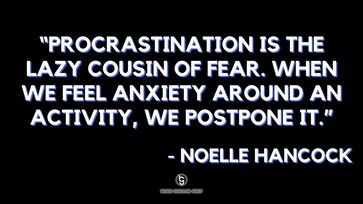Procrastination StoriesWhen asking my leadership class about challenges they face that keep them from being the best version of themselves, one of the more common responses is procrastination. Digging deeper, students pointed to overloaded schedules, demands by parents, and a lack of appropriate time management on their part.
It seems to me that each points to deeper factors. Many people justify their overloaded schedules by pointing to their high expectations - more commitments equals more accomplishments. While this holds with logic, it does not jive in practice. An overloaded schedule is simply an indication of a lack of focus. It’s an attempt to make everything important and, by doing so, we lessen the importance of everything. Students being burdened by the demands of parents is nothing new. It also does not have a solely negative impact. We all perform better when expectations are high. The problem arises when the demands of others, including parents, become a higher priority than our demands for ourselves. Time management is definitely a reflection of our schedules. However, it is more accurately a reflection of our mindset about our schedule. We all have the same amount of time in the day. Any excuse attempting to make your situation unique is irrelevant. Some people manage it well, some don’t. While my students, and many adults, are quick to list these justifications for their procrastination, they all fall short of accurately explaining it. Why Should We Care? Procrastination is typically tagged as laziness from the outside. Of course, we don’t label it that way when we are self-reflecting but we also don’t call it what it is - an avoidance of the negative emotion that surrounds the task we are facing. Sometimes it’s fear, sometimes it’s frustration. Sometimes it’s anger, sometimes it’s boredom. But, it’s usually not laziness. Lazy is an adjective used to describe a person. It’s an indictment of an individual, a judgment of a person’s character. Lazy is an unwillingness to do. Procrastination is choosing something else. It’s redirection and delay, but it’s not always a negative. It’s important to know that our procrastination is tied to the emotion, not the task. Unfortunately, changing our emotions is not simple to do. It’s much easier to just quit or hold off on the task that is creating that emotion. Our emotions are always tied to a story. Gaining control of these stories is the key skill we need in order to redirect our emotions. One of the most important aspects of procrastination that we like to ignore is the progress it can ignite. We can all point to numerous specific examples in which a break from a task has thrust us forward when we return to that very same task. What a shame if we waste years because of our unwillingness to waste days. REAL TALK - Action Steps Let’s focus on rescripting the stories that surround our emotions in order to fend off our natural inclination to procrastinate. Here’s a few ideas:
Procrastination is an emotional affliction. We should be careful to not tie it too directly to character and effort. To combat it best, become a master of the stories you tell yourself about your emotions. Checkout Surrender the Outcome on Amazon and order The Score That Matters with Ryan Hawk & Brook Cupps. The latest blog from Blue Collar Grit can be found here!
0 Comments
Leave a Reply. |
About bcI'm a teacher, coach, and parent seeking excellence while defining success on my own terms. Archives
July 2024
Categories |


 RSS Feed
RSS Feed